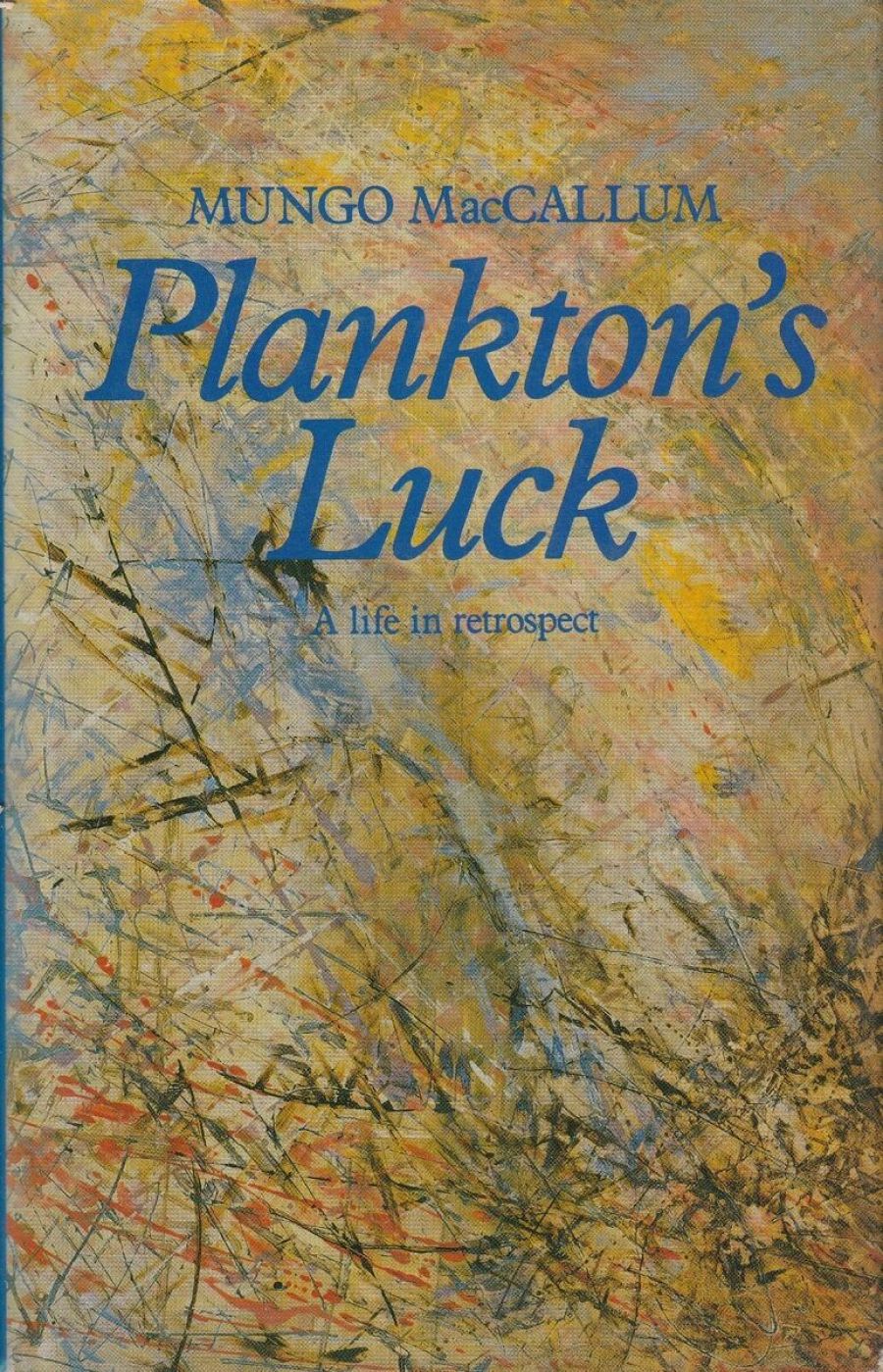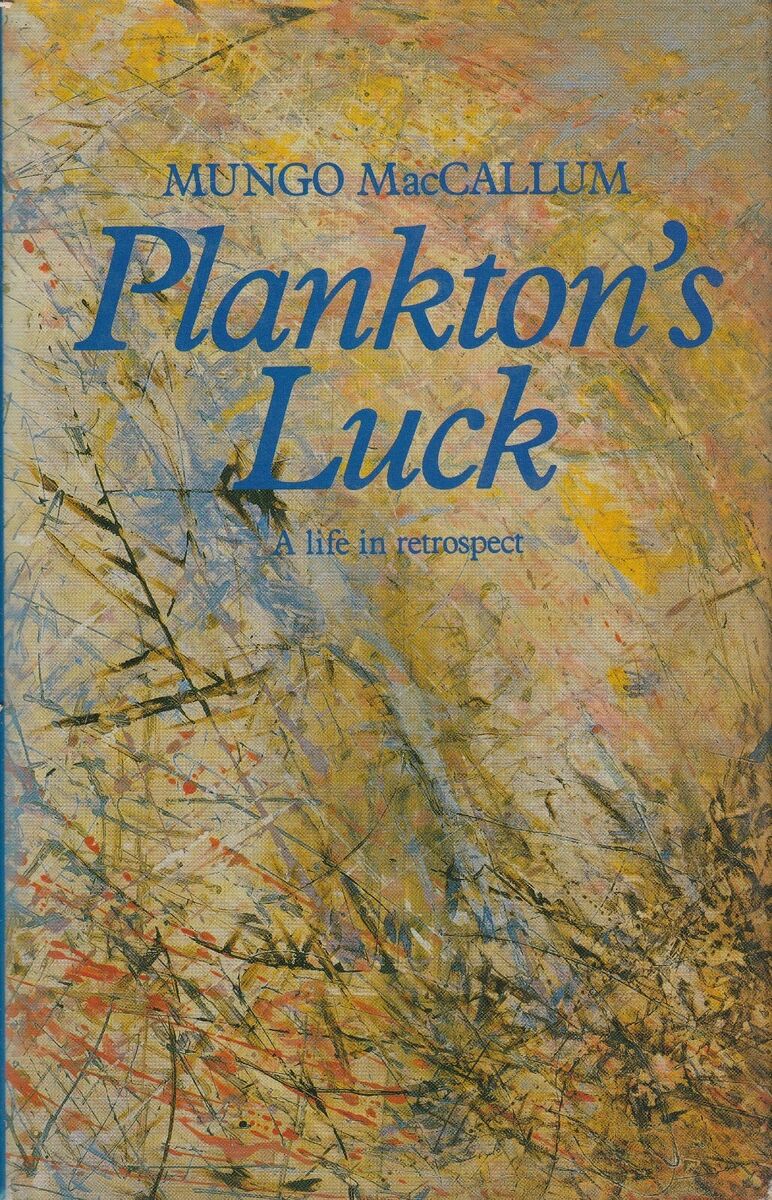
- Free Article: No
- Contents Category: Biography
- Review Article: Yes
- Article Title: Grandma’s Brooding Presence ... in a splendid autobiography
- Online Only: No
- Custom Highlight Text:
Don’t let the silly title put you off; this is a marvellous read, stylish, splendidly crafted, the kind of autobiography that is all too rare in the Australian experience. Who to compare with MacCallum (beware: the elder Mungo, not the one still being rude from Canberra) in recent years? Hasluck perhaps. Whitlam maybe, overlooking the egoism. Donald Horne, again discounting the ego. The genre, if the word must be employed, is restricted.
- Book 1 Title: Plankton’s Luck
- Book 1 Subtitle: A Life In Retrospect
- Book 1 Biblio: Century Hutchinson of Australia, 269 pp, $24.95 hb
- Book 1 Cover Small (400 x 600):

- Book 1 Cover (800 x 1200):

Sadly, with dignity and an affection and regret that are immensely moving, MacCallum writes of almost his last memory of that father, ‘a tottering figure ... on the bank of Blackwattle Bay ... brought by mother to watch the son he wanted to be so proud of.’ It was a terrible moment. ‘From the corner of an eye he seemed to be delighted, smiling widely. Perhaps he was remembering the glowing days on the river at Oxford. I gazed straight ahead. It was the last time I saw him alive – and even then glancingly, which summed up those final years.’
For a young man, only nineteen then, the family – the sense of family – was an oppression scarcely to be borne. Grandmother MacCallum was the particular problem, not to be forgiven even yet, in the author’s seventh decade. She was a remarkable woman, admirable to all not within the family orbit, appalling to her children and grandchildren, and yet so loving, so determined for the success and wellbeing of those she called her own. Mungo MacCallum’s mother lived to 101, loving of and loved by her own children, but overshadowed by the ‘matriarch’s clench ... the iron wrist’ of that extraordinary grandmother, ‘Germanic in her respect for law and order’ (and by descent), known as ‘Dorette’, the brightest of six sisters and two brothers, a ‘Germanic pearl’. Daughters-and sons-in-law marrying into her family in fact married the family. MacCallum writes memorably of the clan clustered together ‘within a few square yards ... a father and mother, daughter and son-in-law, son and daughter-in-law and soon their three children ... A small garden, the remnant of the tennis court, separated flats and house -small enough for Pat to be awakened by grandmother’s snores beyond the shrubbery, only to be told next morning, “I didn’t sleep a wink’”.
His own first marriage collapsed for reasons that hardly need explanation – how could Diana, so vital, so dynamic endure the burden of his family past – the tradition, on the one side of the Wentworths, on the other of the MacCallums – and, more to the point of his grandmother’s ‘iron hand’? MacCallum comes only dimly out of the story: ‘My clincher came soon after marriage in 1939. My wife paid a duty call on Mamie, only to be told with a sweet smile, “What a shame you married him so young, it could ruin his career”. I was twenty-six and doing well at the Herald.’ Beside, there was the legacy of his father’s alcoholism, a failing only too likely to prove fatal for ‘a literary sort of bloke’, a dreamer unsure of his way, all too ready at the Journalists’ Ball to jam a half-bottle into his trousers to impress dancing partners with his virility and lust’.
This is a very Sydney book, yet resonant of names and events with a special appeal for journalists, for men (surely men) who worked for and reminisce still of SALT, that remarkable journal which entertained, instructed and bound together the troops in the Second World War. ‘As in the years of the Herald there was little struggle between internal will and wont,’ MacCallum writes of his years at SALT, of his ‘nook in Bullshit Castle’, at Army H.Q. in Melbourne, in an office furnished with a table and chair and ‘a hovering major with no discernible function who flourished a swagger-stick and the ribbon of the Military Cross’ which turned out later – before he vanished – to have been bought in a pawnshop. Of SALT he writes:
The project was worthwhile and new, creative in its way, and it absorbed me. The conflict was between my will to support the journal’s expanding role and influence on the one hand and the Establishment’s wont on the other. Beginning as a thirty-two-page glorified calendar of A.E.S. activities, eked out with articles, pocket-size, it remained pocket-size for convenience but grew to sixty-four pages a fortnight of report and comment on the war world-wide and the world beyond the war. Troops were given the right – hard won – to write direct to the editor and, as well as being their source of information, the journal became their voice – their opinions, experiences, stories, verse and drawings.
Mungo MacCallum, scion of the Sydney Establishment, has always been in conflict with the Establishment’s wont, whether as journalist with the Sydney Morning Herald, editor of SALT or, perhaps most important, brilliant writer for the ABC, of features for radio and television. He may not command a name in the first rank as an Australian poet or novelist but he writes with style, precision and guile. This is a splendid autobiography. Get hold of it. Read it. Forget that deplorable title.


Comments powered by CComment